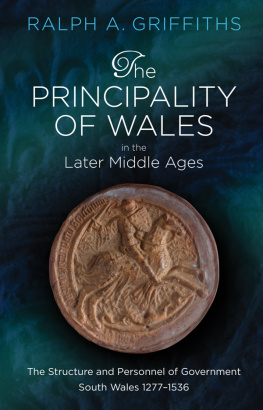STUDIES IN WELSH HISTORY
Editors
RALPH A. GRIFFITHS CHRIS WILLIAMS ERYN M. WHITE
THE GENTRY OF NORTH WALES IN THE LATER MIDDLE AGES
THE GENTRY OF NORTH WALES IN THE LATER MIDDLE AGES
by
A. D. CARR
A. D. Carr, 2017
All rights reserved. No part of this book may be reproduced in any material form (including photocopying or storing it in any medium by electronic means and whether or not transiently or incidentally to some other use of this publication) without the written permission of the copyright owner. Applications for the copyright owners written permission to reproduce any part of this publication should be addressed to the University of Wales Press, 10 Columbus Walk, Brigantine Place, Cardiff CF10 4UP.
www.uwp.co.uk
British Library CIP Data
A catalogue record for this book is available from the British Library
ISBN 978-1-78683-135-4
eISBN 978-1-78683137-8
The University of Wales Press acknowledges the financial support of the Welsh Books Council.
The right of A. D. Carr to be identified as author of this work has been asserted in accordance with sections 77 and 79 of the Copyright, Designs and Patents Act 1988.
The publisher has no responsibility for the persistence or accuracy of URLs for any external or third-party internet websites referred to in this book, and does not guarantee that any content on such websites is, or will remain, accurate or appropriate.
Cover image: Detail of the heraldic pedigree roll of Sir Thomas Hanmer, by William Lln (d. 1580). NLW, Bettisfield Doc. 137, by permission of Llyfrgell Genedlaethol Cymru/National Library of Wales.
SERIES EDITORS FOREWORD
Since the foundation of the series in 1977, the study of Waless history has attracted growing attention among historians internationally and continues to enjoy a vigorous popularity. Not only are approaches, both traditional and new, to the study of history in general being successfully applied in a Welsh context, but Waless historical experience is increasingly appreciated by writers on British, European and world history. These advances have been especially marked in the university institutions in Wales itself.
In order to make more widely available the conclusions of original research, much of it of limited accessibility in postgraduate dissertations and theses, in 1977 the History and Law Committee of the Board of Celtic Studies inaugurated this series of monographs, Studies in Welsh History. It was anticipated that many of the volumes would originate in research conducted in the University of Wales or under the auspices of the Board of Celtic Studies, and so it proved. Although the Board of Celtic Studies no longer exists, the University of Wales Press continues to sponsor the series. It seeks to publish significant contributions made by researchers in Wales and elsewhere. Its primary aim is to serve historical scholarship and to encourage the study of Welsh history.
CONTENTS
I Glenda gyda diolch
PREFACE
This book has grown out of a course I taught at Bangor University on the making of the Welsh gentry which examined the emergence and growth of the Welsh political nation before the Tudor union legislation. It discusses the transition from a social structure based on kindred and on a pattern of land tenure based on lineage groups to an emphasis on land as the basis of individual wealth and influence. At the same time the leaders of this class who were the leaders of the native Welsh community came to dominate native society and this dominance persisted until at least the nineteenth century. While preparing this course I realised that there was no general book on the medieval Welsh gentry and this book is an attempt to fill that gap. The concentration on north Wales, both east and west of the Conwy, is deliberate. In the British context Wales is generally perceived as a single region but in reality it is more than that; it is as much made up of regions as is England or France, albeit not on the same scale. There is a world of difference between Anglesey and Glamorgan or between Flintshire and Ceredigion.
In preparing this book I have benefited from the work of many others, as the bibliography and the references show. I am particularly indebted to my friends and former colleagues the late Tomos Roberts and Einion Thomas, successive archivists at what is now the University of Bangor, and to the late Alyn Giles Jones, who laid the foundations of the professional and efficient organisation which the archives now are. I also owe much to my former colleagues Professor J. Gwynn Williams, Nia Powell and William Griffith, and I am particularly grateful to Alison Davies of Mapping Company Ltd who prepared the maps and to Dr Llion Wigley of the University of Wales Press for his help and advice. Several cohorts of students followed this course and I appreciate their contributions to our discussions. Above all I am grateful to my wife Glenda for her constant interest and support, especially during those dark nights of the soul when I wondered if it was worth carrying on with a project which had already taken so long. The dedication to her is a pleasure.
A. D. CARR
ABBREVIATIONS
Arch.Camb. | Archaeologia Cambrensis |
BBCS | Bulletin of the Board of Celtic Studies |
BPR | Register of the Black Prince |
BUASC | Bangor University Archives and Special Collections |
CAC | Calendar of Ancient Correspondence concerning Wales |
CAP | Calendar of Ancient Petitions relating to Wales |
C.Chart.R. | Calendar of the Charter Rolls |
CCR | Calendar of the Close Rolls |
Cal.Chanc.R.Var. | Calendar of Chancery Rolls Various |
Cal.Inq.Misc. | Calendar of Inquisitions Miscellaneous |
CalIPM | Calendar of Inquisitions Post Mortem |
CPR | Calendar of the Patent Rolls |
CRR | Calendar of the Chester Recognisance Rolls |
DRO | Denbighshire Record Office, Ruthin |
DWB | Dictionary of Welsh Biography |
Econ.Hist.R. | Economic History Review |
EHR | English Historical Review |
Fasti | Fasti Ecclesiae Anglicanae 13001541: The Welsh Dioceses |
FMA 130128 | Flintshire Ministers Accounts 13011328 |
FMA 132853 | Flintshire Ministers Accounts 13281353 |
FRO | Flintshire Record Office, Hawarden Gwydir History History of the Gwydir Family |
JFHS |







